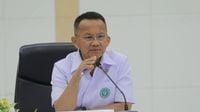On May 10, 2025, Mr. Somsak Thepsuthin, the Minister of Public Health, issued a critical warning regarding the safety of massage practices, following a tragic incident where a massage reportedly led to a fatal brain injury. He emphasized that while massage can provide numerous health benefits, including relaxation and improved circulation, it must be performed correctly and by qualified professionals.
The alarming case involved a woman who massaged her husband to alleviate his pain, only to inadvertently cause severe harm. "In the past, people may have engaged in minor massages without incident, leading to a false sense of security about their safety," said Mr. Thepsuthin. "However, this incident highlights the potential dangers that can arise from improper techniques." He urged the public to seek massages from certified Thai traditional medicine practitioners to ensure safety.
According to the Department of Thai Traditional and Alternative Medicine, there are eight critical areas where massage should be avoided to prevent serious health risks:
- Along the bone and blood vessel lines
- Along the cervical spine
- Along the spinal column
- Near the ribs
- In the neck area
- Under the ear
- Behind the ear
- At the lymph nodes under the chin
Mr. Thepsuthin explained that back massages should focus on the muscle lines rather than the spinal column. Additionally, he cautioned against certain pressure points, advising that any techniques involving the opening of airways should be limited to no more than 45 seconds. He also mentioned that individuals with chronic conditions should receive a proper diagnosis from a qualified Thai traditional medicine practitioner.
Dr. Somruk Jueasaman, the Director-General of the Department of Thai Traditional Medicine and Alternative Medicine, echoed the Minister's sentiments, emphasizing the importance of professional qualifications for massage therapists. "Practitioners must have valid licenses and undergo proper training according to the standards set by the Ministry of Public Health," he stated.
Furthermore, Dr. Jueasaman highlighted the necessity of assessing clients prior to treatment, including checking their medical history and measuring blood pressure to determine the appropriate course of action. Special caution should be exercised for vulnerable groups such as children, pregnant women, the elderly, and those with pre-existing health conditions like heart disease, hypertension, and cancer.
In light of these warnings, Mr. Thepsuthin urged the public to be cautious and informed when seeking massage services, particularly in light of the recent incident. He reiterated the importance of choosing certified practitioners who have received training from accredited institutions.
Meanwhile, on the political front, the Ministry of Interior announced that elections for village headmen and municipal councils would take place on May 11, 2025. This election includes 2,463 polling units across the country, with significant attention focused on areas with high political competition such as Chiang Mai, Nakhon Ratchasima, and Chonburi.
According to Mr. Tharat Ratanaserirat, Deputy Permanent Secretary of the Ministry of Interior, the elections will run from 08:00 to 17:00 hours. There are 2,128 municipal districts holding elections, with 4,558 candidates vying for positions. Voters will be able to select up to six representatives in each council, resulting in a total of 33,346 municipal councilors from 60,515 candidates.
Mr. Ratanaserirat emphasized the importance of ensuring that voters can exercise their rights without obstruction, warning that any interference could lead to severe penalties, including imprisonment of up to five years or fines up to 100,000 baht. He also reminded employers not to hinder their employees from voting, as such actions could result in legal consequences.
Additionally, the sale of alcohol will be prohibited from 18:00 on May 10 until 18:00 on May 11, with violations potentially resulting in fines or imprisonment. Candidates are also barred from providing transportation to voters without charge, with serious penalties for those who violate this rule.
As the election date approaches, authorities have reported a total of 338 complaints related to the electoral process, including allegations of vote-buying. Special monitoring will be in place in competitive areas, with checkpoints established to deter any electoral misconduct.
With the elections looming and the health warnings regarding massage practices, both the public and officials are urged to remain vigilant and proactive in ensuring safety and integrity in their respective domains. The recent events serve as a reminder of the importance of professionalism in healthcare and transparency in governance.




